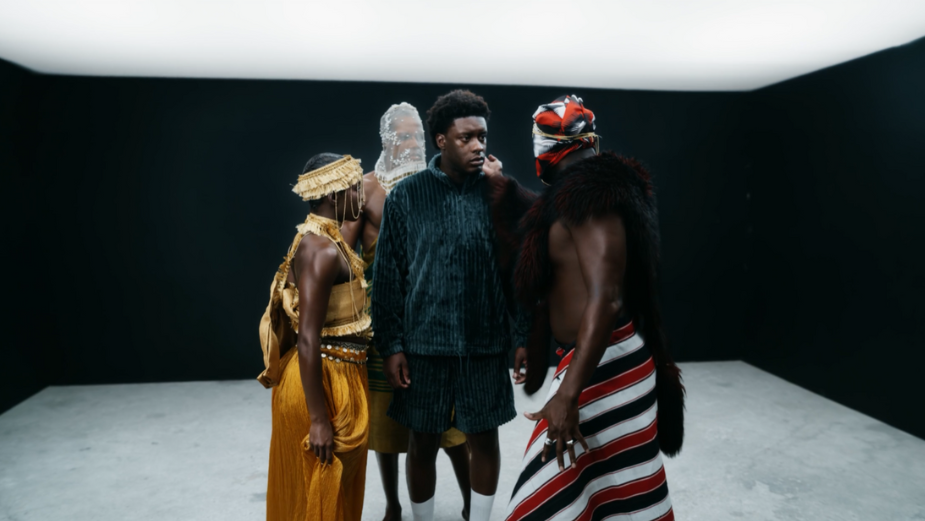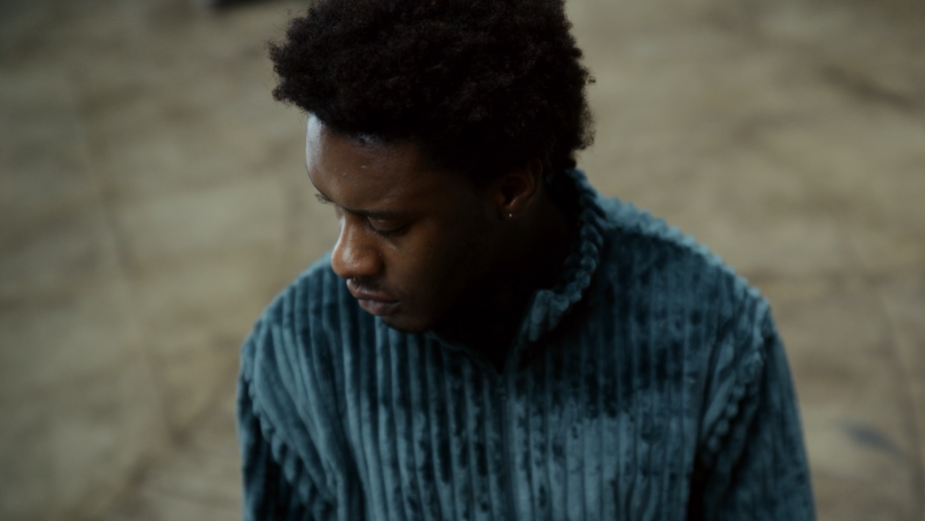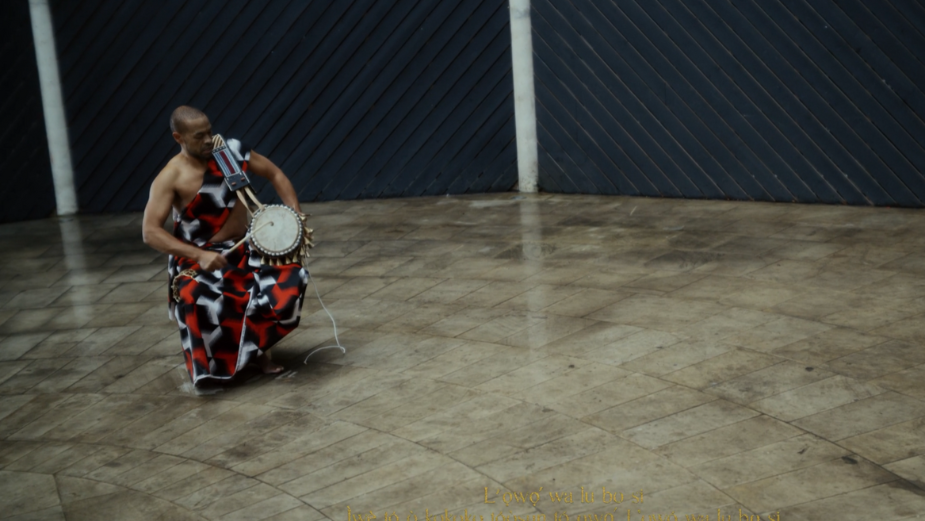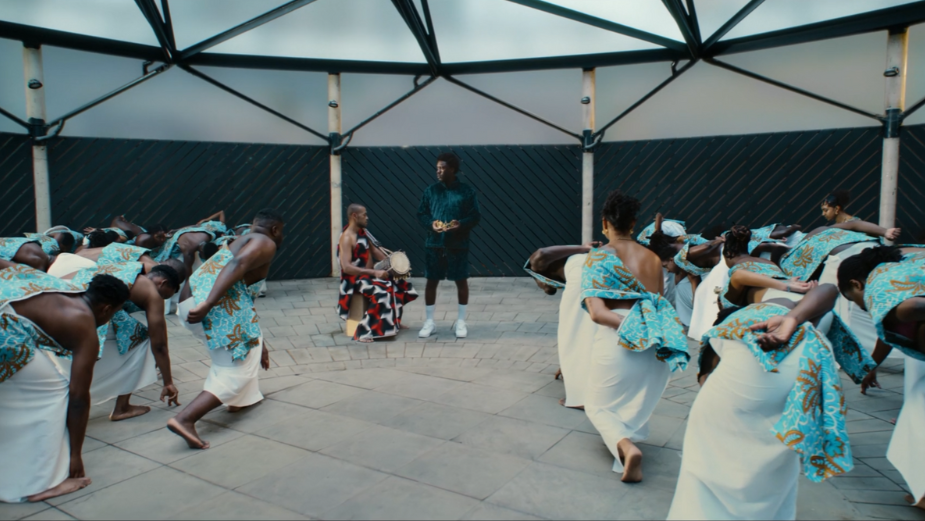
LBB Film Club: OBA

With striking visuals representing an Afrofuturist aesthetic, combined with stark imagery of London, director Femi Ladi combines both of his worlds in his short film ‘OBA’, otherwise known as ‘King’ in Yoruba. Through agency BBH’s ‘Differently Does It’ short film competition, the director worked alongside creatives to visualise his ideas and take a different direction to his usual work in grime music videos and across ads.
Screened at the British Film Institute (BFI), the story explores the culture of the Yoruba people as the King of Oyo dies and a replacement must be found. Starring actor Samuel Adewunmi - nominated for ‘Leading Actor’ Bafta’s as well as a MOBO for ‘Best Performance In a TV Show/Film’ for his role in BBC1’s 2021 drama ‘You Don’t Know Me’ - the story takes viewers through the experience of Black British men, on the fine line between two very different cultures.
To hear more about his vision for the film and how it transpired, Femi speaks to LBB’s Nisna Mahtani, explaining how he took inspiration from Denis Villeneuve's ‘Dune’ while also looking into his own culture and sharing this insight with the team around him.

LBB> Let’s start with the title ‘OBA’, how did you land on this?
Femi> Well, ‘Oba’ means ‘King’ in Yoruba, so it was a fairly straightforward decision. I didn't spend too much time thinking about it, it worked for me straight away and felt right so I ran with it.
LBB> Where did the idea for this piece come from?
Femi> It's a story I've always wanted to explore in some way, as it comes from a very true place. Growing up, I was always told that I'm part of the royal family in Nigeria, but for the longest time, it was something I would brush off as it didn't make sense to me – I grew up on a council estate in Woolwich common. At the time, it was very far from my understanding of what a royal family should live. Also, there was this negative stereotype about Nigerian princes and at the time I was embarrassed when this topic was brought up. As I've grown as a person and as a filmmaker, I started to rediscover and take pride in the richness of my heritage. So when the brief for this film competition came out I really did feel that I could tell this story differently. So it was the ‘Differently Does It’ brief that triggered me into writing this story.
LBB> What were some of the themes/ideas you wanted to convey through this short film?
Femi> As mentioned above the film is a manifestation of my own journey into rediscovering the richness of my heritage. Exploring that in a cinematic way is such a privilege and one I'm really grateful to express.
I tried to mix different ideas together constantly, the first and most prominent was the cultural aspects of [the main character] Ayo's experience as someone with a dual heritage. I also thought it was really interesting to explore Yoruba spirituality in an Afrofutrist world and try to mix traditions that I had heard growing up with a reimagined future. I was also very conscious about making the talking drums a character of their own, enticing Ayo to this destiny. It was really interesting trying to make it feel authentic but also having creative freedom in the execution of these ideas.

LBB> Can you tell us about any existing pieces which you took inspiration from?
Femi> Denis Villeneuve's ‘Dune’ was quite a big influence. I loved the idea of being in the future but without technology, that really helped me form my world. From that, I made a very loose storyboard of key scenes in the film using AI images created on Midjourney. I really enjoyed this process because, at times, it came out with something I didn't quite imagine but felt I could draw inspiration from. A lot of my boards for cinematography and art direction came from some of the AI imagery.
LBB> There is a clear stylisation throughout – can you tell us about some of the techniques you used to highlight the colours in such a vivid and bright way?
Femi> Thank you! Yes, it was a clear intention to have a very vivid look throughout the film. Even though we change through worlds a few times, I wanted to make sure that we exploit the use of colour, detail, and texture through every element of design. From the art direction to the wardrobe and the cinematic choices of cameras and lenses, everything was used to try and make the short feel epic. Then when we got in the grade I worked with Yoomin Lee at Company 3, who really understood what I was trying to go for and helped in bringing the vivid colours that we shot to life.
LBB> How did the themes and inclusion of Yoruba culture influence the piece?
Femi> You can't tell this specific story without the inclusion of Yoruba culture. It's in the DNA of the project. The Oyo Empire [of west African trade] consisted mostly of Yoruba and my family is Yoruba, so it was important I included some of the language and religious aspects in the film. The way the film switches back and forth between Yoruba and English is also just a real example of how I experience life and I really wanted to integrate that with the film seamlessly without too much of a fuss.
I'm also grateful because it really allowed me to explore more of the Yoruba religion and culture and really understand how it has influenced many parts of the world. In my research I came across a really great Netflix documentary about Yoruba culture called ‘Bigger than Africa’. I sent it out to every crew member before the shoot so everyone could be inspired and understand where the power of this story was coming from.
LBB> Why was it important to include both London and Yoruba cultures and what was it like to merge the two into one?
Femi> Being the first generation of my family born in the UK, my experience has always been of the two cultures. Growing up with both I always felt was such an advantage as I can take the best from both worlds. The root of the film is really based on how these two cultures can merge within one person and how to handle that. It was important to me because it was a true reflection of who I am, so I was really just putting myself into the film.

LBB> In terms of the timescale, how long did it take to shoot, edit and finish the project?
Femi> It was a three-day shoot and from the shoot to the final edit was probably about two months. It felt fairly quick to be honest, the post-production on this was smooth. We had a really great editor in Hasani Franke at WORK, who smashed the offline. The final film is not too far from the first edit he showed me and because of that, we really had time to focus on some VFX elements from the bigger pieces down to how we processed the subtitles and use that as a narrative tool to enhance the story.
Massive shout out to Coffee & TV who did an incredible job of creating the world for us. It gave us time to really craft the sound design and score. Jack Hallet at Factory did the sound design and he approached it in such an organic way, really using a lot of elements that were birthed from the film, recycling them and tweaking them to create new incredible sounds. Again, because of how quickly we got the offline done Jack really had time and he did such an intricate job with this, I'm really proud of how the film sounds.
LBB> What was the most challenging aspect of creating the piece?
Femi> The ambitious nature of it. I really wanted to make it feel intimate but also epic at the same time. The scale of the film was something you don't get to experience with shorts so it was defo a challenge, so much credit goes to my heads of department who all really understood the assignment and rose to the challenge of trying to make something that can stand out.
LBB> What about the most rewarding part of the process?
Femi> Obviously, having the final finished film has been great and to just see what all the hard work went into. I'm very proud of what we achieved with the constraints that we had. I will say on the final day of shooting after we wrapped I gave a little speech to the entire crew because I was just so grateful for how they contributed to my idea, I was overwhelmed with emotion. That moment was quite special.
LBB> Do you have any parting thoughts you’d like to share?
Femi> Just thank you to BBH for choosing to make this film with me and to each and every person who worked on this. It was such a labour of love and honestly, it was one of the best filmmaking experiences I've had in a while. It was really inspiring and I'm very happy and proud of how it turned out.













